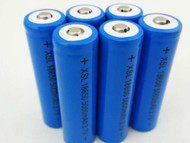Lithium Batteries…
Posted by Callum Nicol on 3rd Feb 2023
Lithium batteries have come a long way since their introduction and are now one of the most popular power sources on the market. They are used in a wide range of applications, from smartphones and laptops to electric outboards (Torqeedo) and renewable energy storage systems. Despite some concerns about their environmental impact, lithium batteries are actually one of the most environmentally friendly power sources available. Here are some of the reasons why.
Lithium batteries are highly energy-dense, meaning they can store a lot of energy in a small package. This makes them ideal for portable devices and electric vehicles, where space is at a premium. The high energy density of lithium batteries also makes them a more efficient choice for storing renewable energy, as more energy can be stored in a smaller space.
Lithium batteries are rechargeable, which means that they can be used over and over again. This reduces the amount of waste produced compared to traditional disposable batteries, as the same battery can be used multiple times before it needs to be recycled. Lithium batteries also have a longer lifespan than traditional batteries, which means that they need to be replaced less often. Lithium batteries can be used for up to four times as many cycles as a lead acid equivalent.
Abundant and Efficient Production Lithium is one of the most abundant elements in the Earth's crust and is widely available, making it a sustainable power source. Lithium battery production has also become more efficient over the years, reducing its environmental impact. This means that the production of lithium batteries is becoming less and less resource-intensive, which is good news for the planet.
Recycling Programs Lithium batteries can be recycled, and there are many recycling programs in place that help to reduce their impact on the environment. This ensures that the materials used to make the batteries are reused and not wasted, reducing the need for new materials to be mined.
Electric Vehicles Lithium batteries are used in various applications, including electric vehicles. Electric vehicles are a more environmentally friendly alternative to traditional fossel fueled powered cars, as they emit fewer greenhouse gases and do not contribute to air pollution. Using electric vehicles powered by lithium batteries can help reduce our dependence on fossil fuels and lower our carbon footprint.
Some lithium batteries use renewable energy sources, such as wind and solar, to power the production process. This makes the production of lithium batteries even more environmentally friendly, as the energy used to produce them is generated from clean, renewable sources.
Lithium batteries can also be used to store renewable energy, helping to make the energy grid more reliable and sustainable. By storing excess energy generated by wind and solar farms, lithium batteries can help to ensure that the energy is available when it is needed, even when the sun is not shining or the wind is not blowing.
In conclusion, lithium batteries are not only highly energy-dense and efficient but also environmentally friendly. With their ability to reduce waste, use renewable energy sources, and store renewable energy, lithium batteries are an excellent choice for anyone looking for a sustainable power source.

